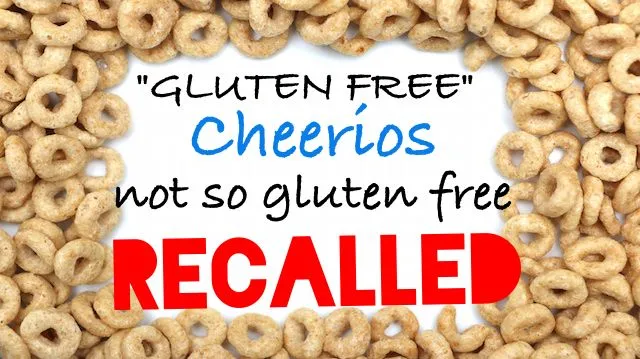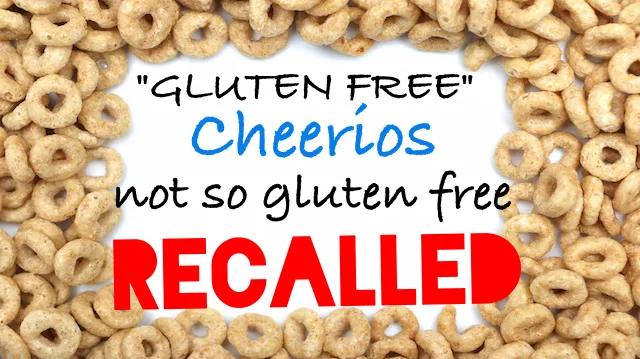
- Share on Facebook17
- Share on Pinterest
- Share on Twitter
Four days’ worth of gluten-free Cheerios production and fourteen days’ worth of gluten-free Honey Nut Cheerios production may have been contaminated during manufacturing at the General Mills facility in Lodi, California. General Mills issued a press release on October 5, explaining the voluntary recall.
“General Mills will recall and retrieve affected cereals produced on those dates from customer warehouses and store shelves,” the press release states. “Consumers with wheat allergies, celiac disease or gluten intolerance should not consume products bearing the affected code dates and should contact General Mills for a replacement or full refund.”
With the recall in full effect, General Mills urges any customers who have purchased Cheerios or Honey Nut Cheerios to call the company at 1-800-775-8370. If you or anyone you know has wheat allergies, celiac disease or gluten intolerance, pass on this information.
According to the American College of Allergy, Asthma & Immunology (ACAAI), wheat allergy symptoms “are usually mild, in some cases they may be severe and can be deadly, making a diagnosis and appropriate management of the allergy imperative.”
Here is a list of wheat allergy symptoms outlined by the ACAAI:
- Skin rash and/or hives
- Sneezing
- Headaches
- Runny nose
- Nausea, vomiting or stomach cramps
- Asthma
- Anaphylaxis, a life-threatening symptom
“There have been reports of illness by consumers online,” Kristie Foster, a General Mills spokesperson told CNN. “Two complaints of illness have been reported directly to General Mills related to the affected products.”
This is not good for General Mills’ marketing push. They have been in a transitional manufacturing period in an attempt to convert five varieties of Cheerios to gluten-free choices. Will gluten-free customers ever trust Cheerios again?
There are four lists you can check on the press release page for the Cheerios recall to see if the box of gluten-free Cheerios you have on your kitchen counter is contaminated. All recalled boxes are easily identified by their designated “Use By” date. The “not so gluten-free” boxes have dates between July 12 and July 25, 2016.
The bigger question is, are breakfast cereals even good for you? Any cereals loaded with sugar are an obvious and definite no-go. Some research suggests that daily, consistent cereal consumption for breakfast may provide nutrition and decrease your risk of obesity, diabetes, cardiovascular disease and hypertension. However, there are only a small number of studies and most have been funded by breakfast cereal manufacturers.
 Research conducted at the University of Canberra and University of Wollongong, Australia was published in Advances in Nutrition (2014), and examined 232 articles relating to cereal and nutrition. The study states, “Dietary guidelines note that the high nutrient density of breakfast cereals (especially those that are whole grain or high in cereal fiber) makes them an important source of key nutrients… However, there have been no comprehensive reviews of their health benefits and there is some uncertainty about their nutritional merits because of concerns about the amounts of salt, sugar, or saturated fat in some products”
Research conducted at the University of Canberra and University of Wollongong, Australia was published in Advances in Nutrition (2014), and examined 232 articles relating to cereal and nutrition. The study states, “Dietary guidelines note that the high nutrient density of breakfast cereals (especially those that are whole grain or high in cereal fiber) makes them an important source of key nutrients… However, there have been no comprehensive reviews of their health benefits and there is some uncertainty about their nutritional merits because of concerns about the amounts of salt, sugar, or saturated fat in some products”
Cheerios may be a favorite breakfast item, but there are better alternatives to processed cereal, gluten free or not. Gluten-free banana bread, banana or squash pancakes, fresh strawberry parfait, and quinoa porridge with almonds, almond milk and dried prunes are just a few of my favorites. Getting creative with your breakfast is fun, and your healthy alternatives for breakfast are always better than what comes in a box.
—Stephen Seifert
Stephen Seifert is a writer, professor, adventurer and a health & fitness guru. His flair for travel and outdoor adventure allows him to enjoy culture and traditions different than his own. A healthy diet, routine fitness and constant mental development is the cornerstone to Stephen’s life.
Sources:
http://www.generalmills.com//en/News/NewsReleases/Library/2015/October/cheerios-10-5/645b5aaf-c2ec-4661-b968-391f41953bfc
http://acaai.org/allergies/types/food-allergies/types-food-allergy/wheat-gluten-allergy
http://advances.nutrition.org/content/5/5/636S.full
- Share on Facebook17
- Share on Pinterest
- Share on Twitter

